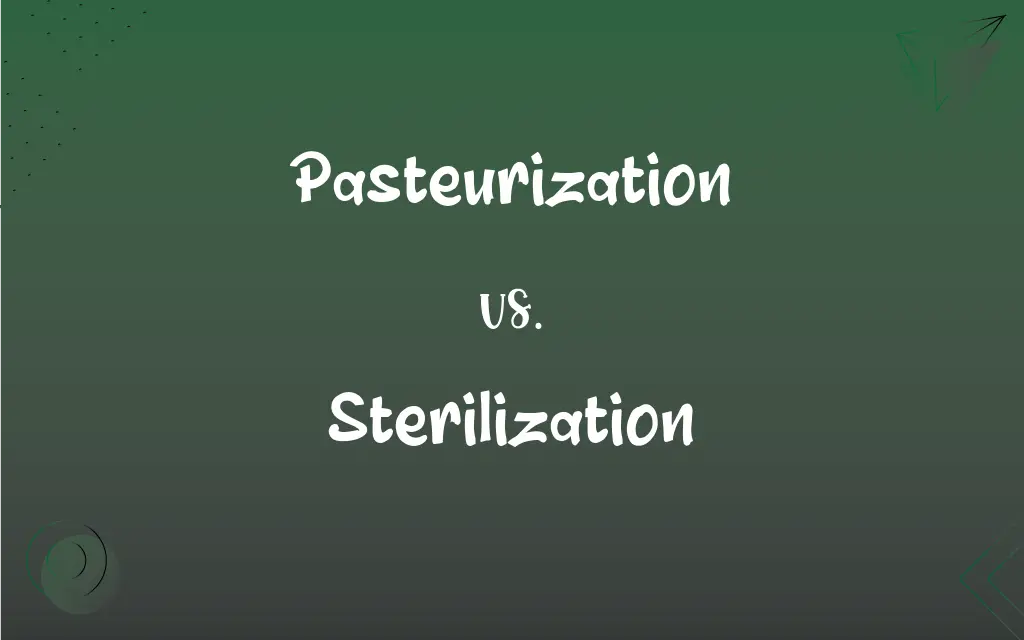Pasteurization vs. Sterilization: What's the Difference?
Edited by Janet White || By Harlon Moss || Updated on October 19, 2023
Pasteurization is a process that uses heat to kill harmful microbes without destroying the food's qualities, while sterilization eliminates all forms of life, including spores, from an object or substance.

Key Differences
Pasteurization is a heat treatment method designed to reduce harmful pathogens in food, particularly in liquids such as milk. Sterilization, on the other hand, is a process that completely removes or destroys all microorganisms, including bacteria, viruses, and spores.
Pasteurization doesn't aim to kill all microorganisms in the product. Instead, it targets pathogens that can cause disease, thereby making the food safer for consumption. Sterilization, however, ensures that an object or substance is free from any microorganisms, achieving total decontamination.
The primary intent behind pasteurization is to increase the safety and extend the shelf life of foods without significantly altering their nutritional value or taste. Sterilization, conversely, is not solely used for food products. It is commonly applied in medical settings to ensure instruments and equipment are free of all microbial life, ensuring patient safety.
While pasteurization often employs milder heat treatments that might not impact the food's nutritional quality, sterilization uses higher temperatures or other methods like radiation or chemicals. This intense process can sometimes alter the properties of the sterilized item.
Both pasteurization and sterilization have their distinct applications in various industries. Pasteurization is mainly associated with the food industry, ensuring safety and freshness. Sterilization finds broader use, especially in the healthcare sector, to maintain a germ-free environment.
ADVERTISEMENT
Comparison Chart
Purpose
Reduce harmful pathogens
Eliminate all microorganisms
Complete Removal
No
Yes
Temperature
Relatively lower
Higher or use of chemicals/radiation
Effect on Product
Preserves most of the product's qualities
Might alter the product's properties
Primary Application
Food industry, especially liquids
Broadly used, especially in healthcare
ADVERTISEMENT
Pasteurization and Sterilization Definitions
Pasteurization
A mild heat treatment applied to food to kill certain pathogens and reduce the risk of foodborne illnesses.
Pasteurization of eggs reduces the risk of salmonella contamination.
Sterilization
A method employed in medical settings to achieve a germ-free environment.
The sterilization of the operating room is of utmost importance.
Pasteurization
A technique named after Louis Pasteur, aimed at reducing microbial loads in food, thus making it safe for consumption.
Pasteurization, introduced by Louis Pasteur, revolutionized the food industry.
Sterilization
The process by which an object, surface, or medium is made free of all living microbes.
The hospital ensures the sterilization of all its medical equipment.
Pasteurization
A process of partial sterilization, especially of liquids, that destroys undesirable microbes without changing the substance's essential qualities.
The pasteurization of beer helps maintain its flavor while ensuring it's safe to drink.
Sterilization
The application of heat, chemicals, or radiation to kill all microbial life on an item.
The lab uses autoclaves for the sterilization of research instruments.
Pasteurization
Pasteurization is the process of heating food, mainly liquids, to a specific temperature to kill harmful bacteria.
By using pasteurization, the dairy industry ensures the safety of milk products.
Sterilization
Sterilization is the complete removal or destruction of all microorganisms, including spores, on a substance or object.
Sterilization of surgical tools is crucial for patient safety.
Pasteurization
A method to extend the shelf life of perishable food products without using preservatives.
Pasteurization helps in keeping the juice fresh for a longer duration.
Sterilization
A process ensuring that a substance is devoid of any viable microorganism.
The sterilization of canned goods ensures a longer shelf life.
Pasteurization
The act or process of heating a food, especially a beverage such as milk or beer, to a specific temperature for a specific period of time in order to kill microorganisms that could cause disease, spoilage, or undesired fermentation.
Sterilization
To make free from live bacteria or other microorganisms.
Pasteurization
The act or process of destroying most microorganisms in certain foods, such as raw meat or fresh fruits and vegetables, by irradiating them with gamma rays or other radiation to prevent spoilage.
Sterilization
To eliminate the ability of a person or animal to produce offspring, as by altering or removing the reproductive organs.
Pasteurization
Alternative spelling of pasteurisation
Pasteurization
A process devised by Pasteur for preventing or checking fermentation in fluids, such as wines, milk, etc., by exposure to a temperature of 140° F., thus destroying the vitality of the contained microorganisms.
Pasteurization
Partial sterilization of foods at a temperature that destroys harmful microorganisms without major changes in the chemistry of the food
FAQs
How does sterilization differ from pasteurization?
Sterilization eliminates all forms of life, including spores, whereas pasteurization only reduces harmful pathogens.
What is pasteurization primarily used for?
Pasteurization is primarily used to reduce harmful pathogens in food, particularly in liquids.
Does pasteurization alter the food's taste?
Pasteurization aims to preserve most of the food's qualities, including its taste.
What methods can achieve sterilization?
Sterilization can be achieved using heat, chemicals, or radiation.
Does pasteurization kill beneficial bacteria too?
Yes, pasteurization can also kill some beneficial bacteria present in the food.
Can sterilization change the properties of an item?
Yes, sterilization might alter the item's properties due to its intense process.
Is sterilization mainly used in the food industry?
While used in the food industry, sterilization finds broader applications, especially in healthcare.
Does pasteurization kill all bacteria in food?
No, pasteurization targets specific harmful pathogens but doesn't kill all bacteria.
Why is sterilization important in hospitals?
Sterilization ensures patient safety by preventing infection from medical tools and equipment.
Does sterilization remove viruses as well?
Yes, sterilization aims to eliminate all microorganisms, including viruses.
Can sterilization methods be harmful?
If not done correctly or if residues remain, some sterilization methods can be harmful.
Can pasteurization be applied to solid foods?
While mainly used for liquids, some solid foods undergo modified pasteurization processes.
Why is pasteurization essential for milk products?
Pasteurization ensures the safety of milk products by killing harmful pathogens.
How long does sterilization typically last?
Once an item is sterilized and remains sealed, it remains sterile until exposed to contaminants.
Can pasteurized products still spoil?
Yes, while pasteurization extends shelf life, the products can still spoil over time.
What temperature is commonly used for pasteurization?
The temperature varies but commonly ranges from 145°F to 162°F for different durations.
Who introduced the concept of pasteurization?
The concept of pasteurization was introduced by Louis Pasteur.
Is everything in a hospital sterilized?
Not everything, but instruments and equipment that come in direct contact with patients are sterilized.
How does pasteurization impact the nutritional value of food?
Pasteurization has minimal impact on the nutritional value of most foods.
Are there different types of sterilization methods?
Yes, common methods include steam autoclaving, dry heat, chemical sterilants, and radiation.
About Author
Written by
Harlon MossHarlon is a seasoned quality moderator and accomplished content writer for Difference Wiki. An alumnus of the prestigious University of California, he earned his degree in Computer Science. Leveraging his academic background, Harlon brings a meticulous and informed perspective to his work, ensuring content accuracy and excellence.
Edited by
Janet WhiteJanet White has been an esteemed writer and blogger for Difference Wiki. Holding a Master's degree in Science and Medical Journalism from the prestigious Boston University, she has consistently demonstrated her expertise and passion for her field. When she's not immersed in her work, Janet relishes her time exercising, delving into a good book, and cherishing moments with friends and family.































































